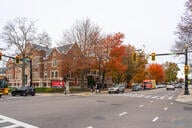You have /5 articles left.
Sign up for a free account or log in.
As Russian troops advanced on Kyiv in late February, Kateryna Zarembo finally made the decision to leave her home, along with her four children.
 “I wanted, up until the very last minute, to believe the war wouldn’t happen,” recalled Zarembo, senior lecturer at the National University of Kyiv–Mohyla Academy who is now based at the Technical University of Darmstadt, in southwest Germany. “We had been asked to pack emergency supplies—dried fruit, matches and sleeping bags—in a suitcase ready to go, but we weren’t completely ready,” she continued, adding, “I understand now why we needed those things.”
“I wanted, up until the very last minute, to believe the war wouldn’t happen,” recalled Zarembo, senior lecturer at the National University of Kyiv–Mohyla Academy who is now based at the Technical University of Darmstadt, in southwest Germany. “We had been asked to pack emergency supplies—dried fruit, matches and sleeping bags—in a suitcase ready to go, but we weren’t completely ready,” she continued, adding, “I understand now why we needed those things.”
These stories of families being separated (Zarembo’s husband remains in Ukraine) and children driven from their homes are reminiscent of those coming out of other war zones in recent years, but there is arguably a crucial difference: although scattered across the world, Ukrainians—including many academics—are still speaking directly to the world about their plight, offering instant analysis and insight on social media often before foreign correspondents and newsrooms have had a chance to unpick events.
One recent example was the heartrending pop video, shot in the ruins of Bucha and Irpin, released by Ukraine’s Kalush Orchestra shortly after its song “Stefania” triumphed at the Eurovision Song Contest in Turin, Italy. As the video, featuring female soldiers rescuing children, became a viral sensation, clocking more than 17 million views on YouTube alone, Zarembo tweeted about how the pop group had skillfully negotiated Eurovision’s strict “no politics” rules to bring the atrocities of war to a new global audience.
“Smart timing, courageous position and professionalism are a recipe for success,” she reflected on the “asymmetrical strategies” that offered hope for Ukraine in other fields of conflict.
“As a policy analyst, I am used to reacting quickly to events and providing advice, but we’re now bringing these insights to the wider public,” she told Times Higher Education.
These immediate reflections on the war via Twitter threads or longer articles are not just about gaining retweets or likes, Zarembo insisted. “Academics can provide strategic insights that really make a difference to what is going on,” she said, stating that recent articles by Yale University scholar Timothy Snyder and University of Copenhagen analyst Maria Mälksoo framing the war in terms of Russia’s colonial ambitions have helped shift political perceptions of the conflict. “These things help to change minds in Brussels and Berlin,” Zarembo insisted.
Insight from Ukrainians is just one of the ways in which the field of war studies has changed since the turn of the year. The discipline has become much more collaborative, with Twitter users jumping on experts’ threads to add their own analyses, said Russia specialist Jenny Mathers, senior lecturer in international politics at Aberystwyth University. “There was a whole thread on Russian truck tires after someone noticed their discoloration and what this poor condition could mean further down the line,” said Mathers, who said that this input from non–war specialists was creating unprecedented engagement with the discipline.
“People are following Ukrainians directly, too—one Kyiv resident, known as ‘strategywoman’, has more than 100,000 followers on Twitter, as people want to see everyday life in Ukraine,” she added.
It has helped bust a few myths about war studies being slightly set back from current affairs, said Mathers. “People maybe imagine war studies is the departmental version of the History Channel, with people simply discussing the Second World War. That is still important research, but war studies is about so much more, from the economy of war or how war interacts with culture, the arts, theater or music,” she added.
While war studies experts can have an almost unlimited run on television or radio if they wish, said Mathers, there was also new demand for even more immediate commentary, with some academics gaining hundreds of thousands of followers on social media since February.
One of those is Phillips O’Brien, professor of strategic studies at the University of St Andrews, whose preconflict Twitter following of about 2,000 has now passed the 100,000 mark. “In that way, the war has brought a completely unexpected prominence to a wide group of war and strategic studies scholars,” he told Times Higher Education.
Moreover, the Russian invasion of Ukraine has revealed “significant shortcomings” in public understanding about military conflicts, with war studies experts helping to provide some answers, said O’Brien.
“Going into the war … the overwhelming consensus that Russia would smash Ukraine relatively quickly was based on no evidence beyond an admiration for Russian weapons and strange disregard, almost disinterest, in the possibilities of Ukrainian resistance,” he said, adding that he set out these ideas in January, a month before the invasion, having been “really confused by how sure people were about Russian success.”
While predicting Vladimir Putin’s next move is always a risk—O’Brien admitted he got it wrong about whether Russia would invade—he nonetheless believed it was “worthwhile to try and provide some possible answers if you believe you have evidence to support your view.”
“I felt I had a pretty good handle on the importance of air power and logistics in war-making, so I set myself those tests early in the war. Did I see Russia as capable of controlling the battlefield with airpower and did Russia have a working, well-constructed logistics system? The answers seemed pretty clear in the opening days—no. And from that I felt I had some handle on what we were seeing,” he said.
Traditionalists may disagree on whether this daily pontificating is worthwhile, but “falling back on the ‘who knows?’ response” does not add to the political and military issues at stake, insisted O’Brien. “I’ve said what I was seeing when the evidence seemed to provide some support for that view. I let the chips fall where they may,” he said.
Star Analysts on the Rise
Lawrence Freedman
The official historian of the Falklands War, and emeritus professor of war studies at King’s College London, has reached a new audience thanks to Twitter, where he has 95,500 followers, and a popular Substack newsletter, run with his son, Sam, a former education adviser to the British government.
Michael Kofman
Advised senior military and government officials while at the U.S. National Defense University and now director of the Russia studies program at the Virginia-based Center for Naval Analyses, and senior fellow at Washington’s Woodrow Wilson International Center. He is one of the most read experts on the war via his blog on the Russian military and his 395,700 Twitter followers.
Rob Lee
Former U.S. Marine, now a Ph.D. student in King’s College London’s department of war studies, and senior fellow at the Foreign Policy Research Institute. Shares videos of artillery and bomb strikes by Ukrainian and Russian forces with his 563,400 Twitter followers.
Maria Mälksoo
The Estonian-born senior researcher in the University of Copenhagen’s Center for Military Studies is author of The Politics of Becoming European: A Study of Polish and Baltic Post–Cold War Security Imaginaries and has won acclaim for her recent study, published in the Journal of Genocide Research, which explores Russia’s postcolonial mentality.
Timothy Snyder
The Richard C. Levin Professor of History at Yale University is one of the world’s foremost experts on central Europe and a prolific pundit. The author of Bloodlands: Europe Between Hitler and Stalin and On Tyranny: Twenty Lessons from the Twentieth Century has 328,100 Twitter followers and a Substack newsletter. He has accused Vladimir Putin of “genocidal intent.”
Not everyone is so comfortable with some of the experts being invited into television studios to talk about Ukraine. “There are now too many armchair generals who are prepared to say virtually anything for a fee and the plethora of new outlets who are prepared to pay,” said Hamish de Bretton-Gordon, former head of the British Army’s chemical weapons division who served in Iraq and Afghanistan before helping uncover atrocities in Syria. “I am one myself, but I only comment on things I really understand, like [chemical weapons] and Syria,” said the visiting fellow at Magdalene College, University of Cambridge.
Nevertheless, keeping Ukraine in the spotlight will be important to ensure the country owns the war’s narrative, rather than Russia, de Bretton-Gordon said. “Strategic communications have come of age in Ukraine and much more focus than [in any other conflict] on shaping the narrative. If Ukraine and NATO can get the correct message to the Russian people, Ukraine will prevail. Though Putin seems unbothered by collateral damage, civilian casualties and war crimes, they will eventually bring him down.”
And war studies experts can certainly help combat forces adapt quickly to meet the changing threat posed by the Russian army, argued de Bretton-Gordon.
“In the U.K. we are especially dreadful at not learning lessons, forgetting lessons and fighting the last war. There perhaps is an arrogance of some commanders to not study the art of warfare and believe they are right just because of the position they hold,” he said.
“So the study of war could not be more important than it is at the moment.”




